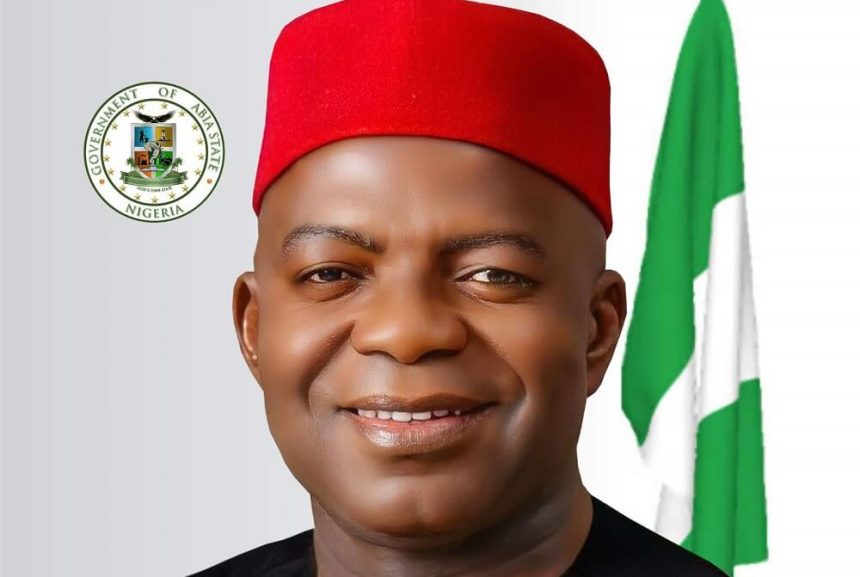Charting a Sustainable Future: Abia State’s Development Dilemma and the Imperative of a Long-Term Vision Under Governor Alex Otti
By: Eric Adile
A New Dawn for Abia State
Abia State, a southeastern Nigerian state rich in history, cultural heritage, and industrious people, has long been yearning for a transformation that would reposition it as a model of sustainable development. Historically, the state has faced numerous challenges, from inadequate infrastructure to poor governance, which have stifled its potential. However, with the emergence of Dr. Alex Otti, elected in 2023 under the banner of the Labour Party, a new wave of optimism has swept across Abia State.
In less than two years, the Otti administration has garnered significant applause for its efforts in revitalizing key sectors and prioritizing the long-neglected infrastructure of the state. Citizens of Abia, along with national and international observers, have hailed the governor’s strides in creating pathways for sustainable growth. However, despite these commendable achievements, the critical question remains: can these efforts translate into long-term, sustainable development?
This investigative report seeks to examine the current state of sustainability in Abia State, assessing Governor Otti’s leadership in comparison with his predecessor, former Governor Okezie Ikpeazu. Furthermore, it will highlight the necessity of adopting a comprehensive long-term development plan, akin to the Abia State Long-Term Development Plan 2020-2050 (ABSLTDP), as a guiding framework for charting a sustainable future for the state. Through detailed surveys, this piece also evaluates Nigeria’s broader development challenges and the imperative for aligning Abia’s sustainability with global frameworks such as the United Nations Sustainable Development Goals (SDGs).
The State of Development and Sustainability Under Alex Otti’s Leadership
Since his inauguration in May 2023, Dr. Alex Otti has been proactive in addressing the state’s pressing issues, particularly the dilapidated infrastructure that has long hindered Abia’s growth. His administration has prioritized the rehabilitation of roads, schools, healthcare facilities, and urban renewal programs aimed at boosting the state’s overall productivity and quality of life for its citizens.
One notable accomplishment has been the rejuvenation of Aba and Umuahia, the state capital, where strategic urban development projects have begun, aimed at modernizing the city while making it environmentally sustainable. Governor Otti’s government has also initiated several initiatives to boost agricultural productivity, with the goal of leveraging the state’s rich agricultural resources as a cornerstone for economic growth and food security.
In stark contrast to his predecessor, Governor Okezie Ikpeazu, whose administration was plagued by inefficiency and accusations of corruption, Otti’s leadership has been characterized by transparency, fiscal discipline, and a clear commitment to making Abia State a hub for sustainable development. Under Ikpeazu’s People’s Democratic Party (PDP) administration, development stagnated, with minimal progress on critical infrastructure projects and little effort to address the state’s alarming poverty and unemployment rates. Public confidence in government institutions deteriorated, as did the state’s environmental and social resilience.
However, while Otti’s administration has made significant progress in a short period, the absence of a robust long-term development plan raises concerns about the sustainability of these initiatives. A critical evaluation of the ongoing projects suggests that although they are impactful in the immediate term, they may not sufficiently address the deeper structural issues plaguing Abia’s development in the long run.
Comparing the Labour Party and PDP: A Leadership Contrast
The transition from Governor Okezie Ikpeazu’s PDP-led government to Alex Otti’s Labour Party administration represents a significant shift in leadership style and governance priorities. Ikpeazu’s tenure from 2015 to 2023 is widely regarded as a lost decade for Abia State, particularly in terms of infrastructure development, job creation, and the promotion of sustainable economic growth.
Ikpeazu’s administration made some progress in industrializing Aba, Abia’s commercial hub, through projects like the Enyimba Economic City, but these were often stalled by poor planning, bureaucratic bottlenecks, and mismanagement. The state’s debt burden also skyrocketed, leaving future administrations with significant fiscal constraints. Consequently, much of the development envisioned under Ikpeazu’s leadership never materialized, leaving critical sectors like education, healthcare, and infrastructure in a state of decay.
In contrast, Otti’s leadership has breathed new life into the state by focusing on practical, citizen-focused policies. In his first year, the governor has tackled several legacy issues head-on, including clearing the backlog of unpaid salaries, modernizing public institutions, and implementing policies aimed at fostering entrepreneurship and innovation in Abia’s informal economy. However, without a well-defined long-term framework, there is a risk that Otti’s achievements could be undone by future administrations or economic shocks, underscoring the need for a sustainable blueprint like the Abia State Long-Term Development Plan (ABSLTDP) 2020-2050.
The Case for the Abia State Long-Term Development Plan 2020-2050 (ABSLTDP)
One of the most forward-thinking initiatives developed during the Okezie Ikpeazu administration, though poorly implemented, was the Abia State Long-Term Development Plan 2020-2050 (ABSLTDP). This 30-year perspective plan was designed as a social compact with Abia’s citizens, aiming to chart a clear pathway for the state’s development across key sectors. The plan emphasized infrastructural regeneration, wealth creation, improved quality of life, and responsive governance, aligning with global trends in long-term planning and sustainability.
However, due to the political failures of the Ikpeazu administration, the plan was left largely unimplemented. The Otti administration has an opportunity to revisit and modify the ABSLTDP, refining its objectives to align with current realities and ensuring that it serves as a framework for sustainable development in Abia State.
The ABSLTDP, developed with technical and financial support from the Partnership Initiative for Niger Delta Development (PIND), is modeled on global best practices, providing a measurement framework for state-led development. The plan sets out clear benchmarks for Abia’s progress, with periodic reviews every five years to ensure adaptability and relevance. However, the failure to implement this plan under Ikpeazu’s leadership has left Abia without a clear, long-term strategy for sustainable growth.
Partnership Initiative for Niger Delta Development’s (PIND) Contributions
The Partnership Initiative for Niger Delta Development (PIND) has played an instrumental role in supporting long-term planning efforts in Abia State. As part of its program to foster development in the Niger Delta region, PIND offered both technical and financial assistance in crafting the Abia State Long-Term Development Plan. This was part of a broader initiative that also saw Edo State benefit from a similar plan.
PIND’s involvement underscores the importance of regional collaboration in addressing the unique developmental challenges faced by states in the Niger Delta. PIND’s support for the ABSLTDP was intended to ensure that Abia had a roadmap for sustainable development that could withstand the transitions between successive governments. Despite the challenges faced in its initial implementation, the plan offers a valuable template for the Otti administration to adopt, modify, and execute as part of its broader agenda for sustainable development.
The Urgent Need for a Comprehensive Long-Term Development Plan
As Abia State continues to rebuild under Alex Otti’s leadership, there is an urgent need for a comprehensive, long-term development plan that will guide the state’s progress beyond the immediate gains of his administration. Such a plan should focus on sustainability, inclusivity, and resilience, addressing not only the state’s current challenges but also preparing for future uncertainties.
A long-term plan, such as the ABSLTDP, offers a clear framework for measuring the impact of government policies, ensuring that development efforts are aligned with the needs and aspirations of Abia’s citizens. It also provides continuity, ensuring that future administrations can build on the foundations laid by their predecessors. Moreover, a localized development plan, rooted in the unique realities of Abia State, will foster greater citizen participation and ownership of the development process, as advocated by global frameworks like the UN SDGs.
Nigeria’s Broader Development Challenges and the Lessons for Abia State
Nigeria’s development trajectory has been marked by the failure of successive governments to implement long-term development plans. From the Vision 2010 to the more recent Economic Recovery and Growth Plan (ERGP), Nigeria has struggled to create a consistent policy framework for sustainable development. Poor governance, political instability, corruption, and a lack of continuity have often derailed even the most well-intentioned plans.
For Abia State, the lessons from Nigeria’s broader development challenges are clear: without a strong, long-term vision, sustainable development will remain elusive. Governor Alex Otti’s administration must take a second look at the ABSLTDP and consider it not just as a document from a previous administration but as a critical tool for the future. By adopting and modifying the plan, the Otti government can ensure that Abia State is on a path to sustainable, inclusive growth that will benefit both current and future generations.
The Future of Abia’s Development
Governor Alex Otti’s administration has made commendable progress in addressing the immediate development challenges facing Abia State. However, the long-term sustainability of these efforts depends on the adoption of a comprehensive development plan like the ABSLTDP 2020-2050. By revisiting and enhancing this plan, the Otti government can create a framework for sustainable development that will outlast its administration and serve as a blueprint for future leaders.
The Abia Sustainability Roundtable Series, a village-square platform for citizens’ engagement, has already begun driving attention to the plan, ensuring that it remains top of mind for both the government and the people of Abia. With the right political will and a focus on long-term goals, Abia State can become a model for sustainable development, not just in Nigeria, but across Africa. The time to act is now.
Eric Adile Iroajugh, a Development Communication Expert is the Executive Vice Chairman, Alikwomobu Center for Sustainability and Participatory Development


Leave a Reply